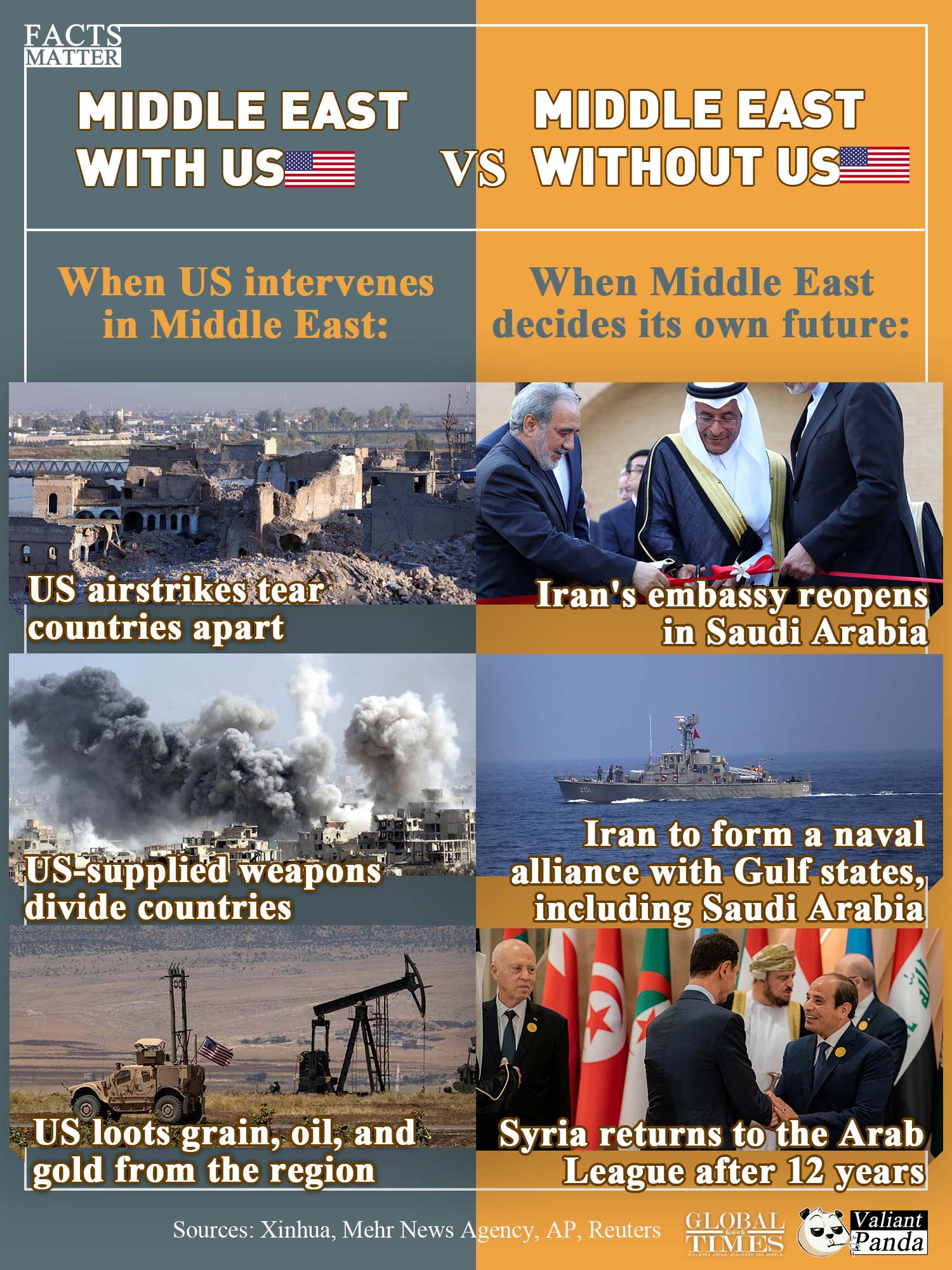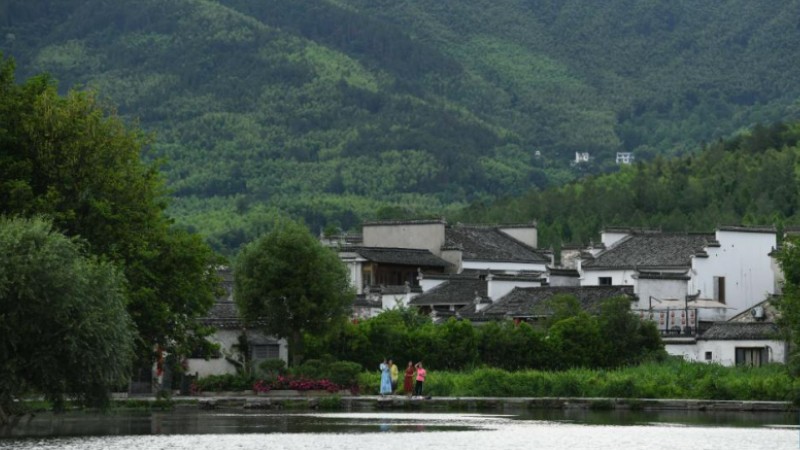Reopening of Iran embassy in Saudi Arabia a milestone for reconciliation brokered by China

Iran reopened its embassy in Saudi Arabia on Tuesday after seven years of closure. The peace process accelerates in the Middle East as the region determines its own future. Graphic:GT
The reopening of the Iran Embassy in Saudi Arabia, which marked a milestone accomplishment for the two countries' reconciliation brokered by China, may lead to solutions of a series of rifts in the region and improve the geopolitical environment in the Middle East, Chinese analysts said on Wednesday.
The event, which coincides with US Secretary of State Antony Blinken's visit to Saudi Arabia on the same day to steady bilateral relations and fend off China's increasing influence, demonstrates that the new view on security proposed by China and other developing countries is growing popular among regional countries, who are seeking to be the real owners of the region to avoid becoming proxies of some Western countries and the US, observers said.
A ceremony was held inside Iran's new embassy compound in Saudi Arabia on Tuesday with dozens of diplomats and officials attending the reopening of the diplomatic mission for the first time in seven years, Reuters reported.
Iran and Saudi Arabia reached a landmark agreement brokered by Chinain March to restore diplomatic ties and reopen their respective embassies. In April, Iran's Foreign Minister Hossein Amir-Abdollahian and Saudi Foreign Affairs Minister Prince Faisal bin Farhan Al Saud met in Beijing with Chinese State Councilor and Foreign Minister Qin Gang, with Iran and Saudi Arabia announcing the resumption of diplomatic relations with immediate effect.
The reopening of the Iran Embassy in Saudi Arabia after seven years of closure marks a milestone for the region and highlights regional countries' increasing efforts at strategic independence to become the real owners of the region, Sun Degang, director of the Center for Middle Eastern Studies at Fudan University, told the Global Times on Wednesday.
For the past 11 years, the Middle East has been blighted with severe sectarian strife and endless proxy wars and conflicts, but now Saudi Arabia and Iran are working for reconciliation, which will further promote the regional peace and normalization of relations between previously divergent countries, including Iran and Arab states, and Turkey and Arab states, Sun said.
The positive trend in the Middle East also shows how China's proposal on global security and developing countries' views of regional security and global governance have taken root and yielded achievements as regional countries chose to promote security via cooperation and communication, said the expert.
Analysts hailed the ice-breaking resumption of diplomatic relations between Iran and Saudi Arabia and expected it to promote the resolution of a series of geopolitical conflicts and greatly improve the geopolitical environment in the Middle East. The US has been anxious about the current reconciliation in the Middle East as its allies are not closely following its baton but shaking hands with US' "enemies."
On Tuesday, Blinken met with Saudi Arabia's Crown Prince Mohammed bin Salman. The US top diplomat was also set to meet other senior Saudi officials in Riyadh, the capital, and the coastal city of Jeddah, Reuters reported.
Topics on cooperation with Saudi Arabia to mediate the conflict in Sudan, improving US-Saudi Arabia relations, and promoting the normalization of relations between Saudi Arabia and Israel are on Blinken's agenda in Saudi Arabia, Ding Long, a professor with the Middle East Studies Institute of Shanghai International Studies University, told the Global Times.
However, the real goal for Blinken and other senior officials who recently visited Saudi Arabia, including White House national security adviser Jake Sullivan, is to prevent geopolitical changes in the Middle East - from the resumption of diplomatic relations of Iran and Saudi Arabia to the return of Syria to the Arab League, said Ding.
The US is eager to hold its significant ally Saudi Arabia fast in hand and save its ally system by fixing ties with Saudi Arabia. However, its strategy in the Middle East is out of date.
The pillar of US-Saudi Arabia relations has been shaken as the US no longer needs oil from Saudi Arabia and its strategic contraction in the region means it cannot meet allies' demands for security, said Ding.
While it is hard for the US to maintain a dominant influence in the Middle East, it still treats the area as the middle region for the competition of major countries and tries to exclude other countries' influence, which has incurred increasing dissatisfaction, said analysts.
China's increasing influence in the region has worried the US, and some US media reported that during his stay in Saudi Arabia, Blinken worked to fend off China's and Russia's influence.
Along with the increasing awareness of independence is the decline of US influence in the region. The US should abandon its Cold War mentality and the hegemonic mentality of treating the region as its sphere of influence, said Sun, noting that the Middle East is large enough and China has always welcomed different countries to contribute to the building of the region.
Photos
Related Stories
- Possible Iran-Arab naval coalition proof of greater regional confidence, rising distrust in U.S.
- Iran reopens embassy in Saudi Arabia after 7-year closure
- Iran's top leader says retreating won't stop U.S. hostility
- Iran denies IMF access to certain classified economic data due to U.S. sanctions
- Iran slams U.S., France for voicing concern over new ballistic missile
- Canada, Saudi Arabia restore full diplomatic relations
- Iranian president says U.S. democracy advocacy "fake"
- Iran condemns G7 for financial allegations
- How a parcel from China is delivered in Saudi Arabia
- Iran says U.S. pullout from nuclear deal "fatal blow" to rule of law
Copyright © 2023 People's Daily Online. All Rights Reserved.









